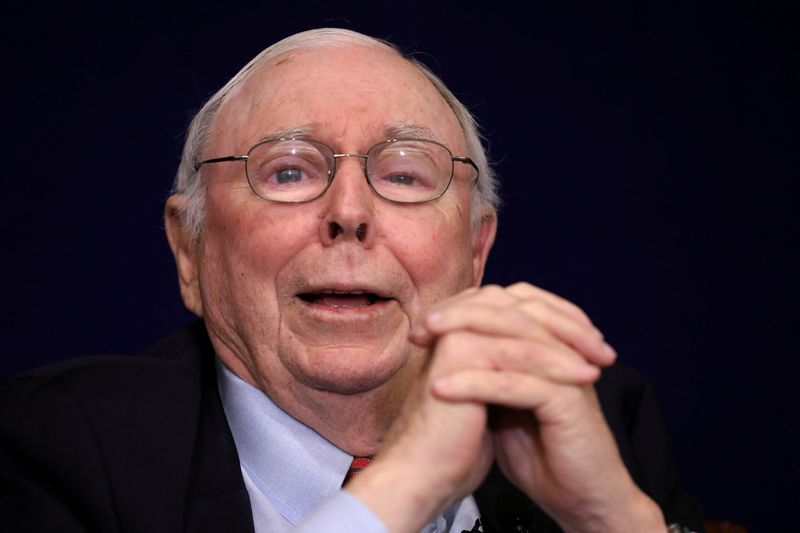Investing.com -- Berkshire Hathaway Vice Chairman Charlie Munger passes away at 99, leaving behind a legacy burnished by a brilliant business career and a fruitful partnership with investment icon Warren Buffett. Elsewhere on Wednesday, U.S. futures push higher after stocks rose in the prior session following dovish comments from a top Federal Reserve official.
1. Charlie Munger dies at 99
Charlie Munger, a superlative investor and billionaire vice chairman of Berkshire Hathaway (NYSE:BRKa), died on Tuesday at a California hospital. He was 99.
Known as the right-hand man of Berkshire's head Warren Buffett, Munger often sparred with him over investment strategies. Munger's tactic of snapping up stakes in solid companies with strong potential future cash flows contrasted with Buffett's plan to buy up mediocre firms cheaply.
Buffett has written that he was eventually persuaded by Munger to ditch what he called "cigar-butt" bets. Buffett called himself a "slow learner." Together, the men worked to turn Berkshire from a rundown textile manufacturer into an investment empire worth almost $800 billion.
But Munger, a lawyer by training, was also a stellar investor in his own right. Prior to joining Berkshire's board, Munger founded a separate partnership in 1962 that posted average annual gains of just over 24% - far outpacing returns from the S&P 500.
2. U.S. futures edge higher
U.S. stock futures ticked into the green on Wednesday after dovish comments from Federal Reserve Governor Christopher Waller fueled a rise in equities on Wall Street in the prior session.
On Tuesday, the main indices climbed by 0.1% or more, resuming a November rally that had temporarily paused at the beginning of the trading week. The 30-stock Dow Jones Industrial Average is on pace to end the penultimate month of the year up by 7.2%, while the benchmark S&P 500 and tech-heavy Nasdaq Composite have jumped by 8.6% and 11.1%, respectively.
Giving additional support to stocks were U.S. Treasury yields and the dollar index, which both slipped to their lowest levels since August on Tuesday following Waller's statements (see below).
3. Fed's Waller points to policy pivot
Federal Reserve Governor Christopher Waller has suggested that the U.S. central bank's monetary policy is "well-positioned" to cool inflation.
In an address to a think tank on Tuesday, Waller, normally known as a hawkish voice at the Fed, said the rate of price growth seems to be "moving along pretty much like I thought." In October, headline inflation in the U.S. slowed by more than anticipated to 3.2%, due in large part to a decline in gas costs.
Waller added that, should inflation continue to ease back down to the Fed's 2% target for "several more months," there is a chance that officials "could start lowering" interest rates. Borrowing costs currently stand at a more than two-decade high of 5.25% to 5.50% after a long-standing campaign of policy tightening aimed at corralling red-hot price gains.
"There is no reason to say we will keep [the policy rate] really high," Waller noted.
His comments bolstered hopes that the Fed will roll out rate cuts next year, with some traders moving to price in a reduction as soon as May. "We had not been expecting it this early, but some of the Federal Reserve hawks now seem to be happy to express a view that the inflation battle is won," analysts at ING said in a note on Wednesday.
4. Apple to end credit card partnership with Goldman Sachs (NYSE:GS) - WSJ
Apple (NASDAQ:AAPL) is moving to pull the plug on its credit card partnership with Wall Street banking giant Goldman Sachs, according to a report in the Wall Street Journal.
Citing people familiar with the matter, the paper said the iPhone maker has sent a proposal to Goldman to end the contract in roughly 12 to 15 months. The exit would cover their entire consumer partnership, including a virtual credit card introduced in 2019 and a savings account unveiled earlier this year, the report added.
Terminating the agreement, which the WSJ said was extended last year through 2029, marks a blow against Goldman's ambitions to expand into consumer lending. Building out the offering has proved to be costly for the bank, leading to losses worth billions of dollars.
Although the partnership only accounted for a small part of Apple's revenue, ending it is a setback for the California-based company's services business, which has become a key recent source of income during a time of sluggish demand for smartphones.
5. Crude jumps amid supply disruptions
Oil prices recorded small gains Wednesday, boosted by more supply disruptions ahead of a crucial OPEC+ meeting to discuss future production levels.
A severe storm in the Black Sea region has disrupted up to 2 million barrels per day of oil exports from Kazakhstan and Russia, sparking concerns over short-term supply tightness.
These worries, however, could be alleviated if the Organization of the Petroleum Exporting Countries and its allies, a group known as OPEC+, decide to announce deeper production cuts at a gathering on Thursday.
The meeting had been delayed from Sunday following disagreements between members over production targets, suggesting an accord will not be easy to reach.
